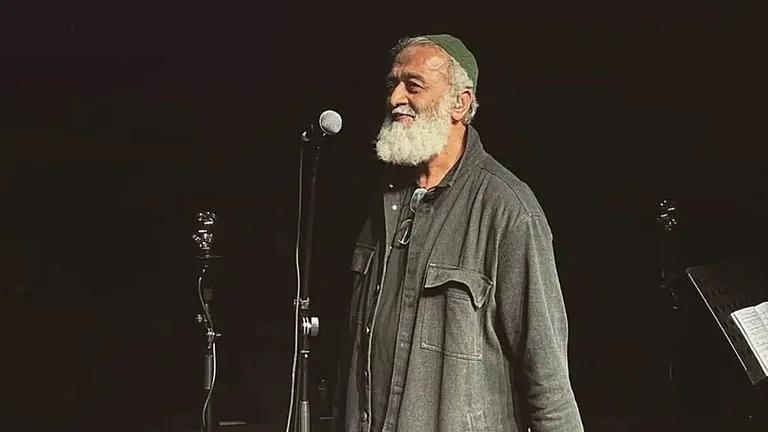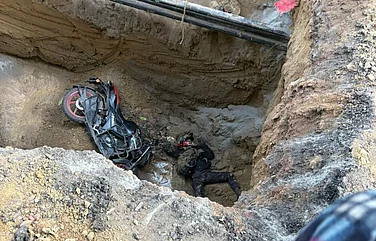Lucknow streets are still full of hoardings of ousted Uttar Pradesh chief minister Mayawati, depicting her smiling visage. But when you meet her within the dim confines of her fortress-like home these days, she strikes a rather different pose, with an almost permanent dark scowl on her face. In fact, the first woman Dalit chief minister of the country was in a very foul mood a day after submitting her resignation to Governor Motilal Vora. "I will teach the Bharatiya Janata Party (BJP) a lesson," she declared. "In the municipal elections itself."
On October 17, BJP leaders led by Murli Manohar Joshi called on Vora to formally withdraw support to the Bahujan Samaj Party (BSP). And with her 69 MLAs in a House of 425 members, Mayawati had no option but to quit. She went quietly, but with a pang. For, it was ssp supreme Kanshi Ram who forced the BIP'S hand and ended four months of Mayawati's rule. "She would have liked to remain. Kanshi Ram forced her to leave the chair," said party worker Prabhashankar Pandey.
That Mayawati had hoped to continue as chief minister was evident from the fact that her name figured in the list of nine SSP candidates proposed for nomination to the Vidhan Parishad (which was later rejected by Vora). This was a rather unconventional move and if she had succeeded she would have become the first ever chief minister to be a nominated member of the Upper House. Convention has it that most chief ministers who are not members of either house of the legislature get themselves elected to the Lower House. But her December deadline was fast approaching. That Mayawati eventually reconciled herself to leaving the post was apparent from her alacrity in moving out of the chief minister's official residence and ordering renovation of her new government bungalow on Mall Avenue.
As a pall of gloom enveloped the SSP office in Lucknow, Mayawati barricaded herself in her new-found home, inaccessible to all but her entourage, a few leaders and persistent mediapersons, SSP workers from all over the state wandered outside in disconsolate groups. Resentment against her ran high. The prevailing view among the workers was that in her flirtation with the BJP, Mayawati had ignored her own party workers.
Reactions ranged from a furious " usko pet-bhar khaana no milay (may she starve)," to a cynical "who says she is a Dalit? Does a Dalit live in a mansion like this?" It is clear that Mayawati's abrasive manner and conspicuous consumption have not endeared her to the party rank- and-file, who owe their allegiance to Kanshi Ram. Complained Ram Sagar of Barabanki: "With all my heart, I want to further the BSP. But even the smallest facilities are not provided. I have been begging for a vehicle to organise a public meeting but none is available." As if on cue, a cortege of four vehicles sped out of Mayawati's residence.
The spoils of the SSP's stint in power have not trickled down the party hierarchy, sharpening the anti-Mayawati feeling within the party. A group from Bhadohi claimed to have paid her (through a middleman) a large sum to get their money- spinning projects cleared, with no results. The feeling of neglect is clearly working to the advantage of the Congress. Party workers like Jai Raj, who had crossed over from the Congress to the SSP, are now planning to make the reverse trip. Younger workers, too, plan to jump ship.
With the benefit of hindsight, left-aligned SSP workers feel that perhaps Dalits should seek empowerment through struggle rather than opportunistic alliances, but hasten to add that party leaders had no choice but to accept BJP support against a rampaging Mulayam Singh Yadav. "We swallowed poison to counteract a greater poison," observed Zafar, a party functionary.
The despondency at the BSP office, writ large on the face of state BSP chief Jung Bahadur Patel, was accentuated by the crackers bursting joyously at the BII~ office next door. Supporters of former chief minister Kalyan Singh are thrilled to have had their way in compelling the party leadership to withdraw support to the BSP. They do not question the political rationale behind the alliance--breaking the Dalit-OBC-Muslim combine and projecting the BJP as pro-Dalit--but say the BSP ensured its failure.
Exclaimed BJP worker Ramashish Rai: "How long could we keep silent in the face of the BSP'S excesses? We were losing support and finding it difficult to explain how the BSP could abuse Ram and Gandhi without a chirp out of us. The sins of the BSP government were being visited on the BJP." He admitted that the party's support base had been eroded but said that once Kalyan Singh hit the campaign trail, it could be wooed back.
With the BJP central leadership having acceded to Kalyan Singh, supporters of state unit chief Kalraj Mishra were reluctant to speak up. The division in the state unit was obvious despite half-hearted protestations of party unity. An upbeat Singh dubbed the BSP-BIP pact a "failed experiment", while a sombre Mishra said it was an "incomplete experiment". Revelling in the new-found freedom to lash out openly at Mayawati, the former chief minister claimed: "From the moment we withdrew support, our votes increased by 5 per cent. If we had not done so, we would have lost heavily. We do not share the sins of the BSP government, which was run just as the RSP liked, a government which protected the mafia instead of Dalits and pocketed money instead of spending it on the development of the state."
Putting on a brave face on what was obviously a demoralising development, Mishra said the fall of the Mayawati government had been on the cards for a long time. But while the party's central leadership had for months backed his stand that the alliance should somehow continue till the Lok Sabha polls, it was Kalyan Singh's 70-odd OBC MLAs who carried the day.
The celebratory mood in the B1P office was, however, dampened soon enough when Vora accepted Mayawati's resignation but decided to keep it under suspended animation. The hopes of simultaneous Lok Sabha and Assembly polls virtually vanished. Central leaders who had been hoping for a rich harvest of Lok Sabha seats were also subdued. And soon enough, even as the central leaders categorically ruled out staking a claim for the formation of a new government in Uttar Pradesh, state leaders began 'exploring' the possibility of engineering defections from the BSP, the Samajwadi party and even the Congress to try and form a government. The prospect of remaining out of power for six months more was somewhat daunting.
Even Yadav, who was anticipating early Assembly polls and a return to power, was forced into reassessing the situation. He hurried back from New Delhi, as much as to see whether he could re-emerge as the non-BJP alternative as to ensure that the right-wing party did not succeed in luring away his MLAs in a bid to form a government.
Only the Congress was reasonably happy, content in the knowledge that it would rule the state through the backdoor. Whether or not the party had the organisational wherewithal to take advantage of the situation was another matter. For hadn't the party been totally routed in the state the last time around despite Uttar Pradesh being under President's rule?
The smugness in the Congress camp led most people to believethat Vora was partial to the party. Vora had his 'constitutional' arguments ready. He quoted from the judgement in the S.R. Bommai case: "it is permissible under Article 356(1) ... firstly only to suspend the Mulayam Singh: reassessing the situation political executive or any authority in the state and also the legislature of the state and not to remove or dissolve them ... (it) will not be permissible for the President to... take irreversible actions until at least both Houses of Parliament have approved the proclamation. It is for this reason that the President will not be justified in dissolving the Legislative Assembly until at solving the Legislative Assembly until at least both Houses of Parliament approve the proclamation."
But constitutional expert Rajeev Dhawan wondered whether the governor was "up to democracy or up to mischief". He noted that exploring the democratic alternative was a double-edged weapon: "If you don't explore it, popular government goes. If you do, all the greed and corruption of Indian politics pours in.
While the constitutional niceties are being debated, the political situation in Uttar Pradesh remains as fluid as ever. Mortified at losing their membership of the Assembly with more than half of its term still left, MLAs Of all hues are giving in to their survival instincts. This has opened up the possibility of large-scale horse-trading. But then, that's nothing new in contemporary Indian politics.


























